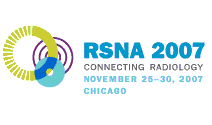
Abstract Archives of the RSNA, 2007
Shi Yu MS, Presenter: Nothing to Disclose
Qiyong Guo MD, Abstract Co-Author: Nothing to Disclose
Zaiming Lu, Abstract Co-Author: Nothing to Disclose
Shinong Pan MD, Abstract Co-Author: Nothing to Disclose
Diffusion-weighted MRI is a promising and non-invasive method to measure the grade of liver fibrosis. Our study assesses whether hepatic diffusion measurements are influenced by hepatic perfusion changes that could be an important variable when studying ADC measurements.
12 volunteers were involved with no history of liver diseases(5 female, 7 male, age 19-43years). Hepatic apparent diffusion coefficients (ADCs) were measured before and right after a 1500m-running exercise (which is regarded as an effective method to decrease hepatic perfusion including portal vein flow and perfusion of vena cava).All the examinations were performed at a 1.5 T MR in one breath–hold for 20.6s at b–values of 800, 400 and 200 and 0s/mm² at a static state, then the procedure above was repeated right after running(within 5min). The ADCs were analyzed by a non-parametric Wilcoxon Sign-Rank test on the paired datas to determine whether the changes of ADCs were significant before and after exercise. A cine phase-contrast velocity study was also performed to acquire the main portal vein and bulk flow(mL/min) for both states.
After exercise, we found that portal blood flow decreased significantly (P<0.01) in all cases with mean rate 34%. The ADC values at b=800s/mm² in both posterior and anterior right lobe were unaffected by perfusion changes(P=0.19 and 0.14 respectively)whereas the results from b=200s/mm² were just the opposite, the ADCs decreased significantly after exercise in both segments of right lobe (P=0.02 and 0.01respectively).As for b=400s/mm², only the ADCs in posterior right lobe were unchanged significantly after exercise(P=0.11).For b=800 and 400s/mm², the CVs were slightly higher in the anterior right lobe than the posterior right lobe, as well as before exercise than after exercise.
As for the measurements of ADCs in liver, the effect of perfusion may be minimized at higher b-values and in the posterior right lobe among volunteers, which may offer the most consistent ADC values and best measuring conditions for further studies.
our study may offer an optimized measuring condition for further application of DWI in liver.
Yu, S,
Guo, Q,
Lu, Z,
Pan, S,
Influence of Perfusion on Hepatic MR Diffusion Measurement in Volunteers. Radiological Society of North America 2007 Scientific Assembly and Annual Meeting, November 25 - November 30, 2007 ,Chicago IL.
http://archive.rsna.org/2007/5008603.html

